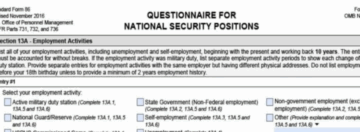DoD Underreporting Adverse Information is an Issue

In the security clearance world we all know reporting adverse information or suspicious behavior for clearance holders is a requirement, but does it happen? Based on my own experience I would say the odds are 50-50 depending on who is involved and the potential impact. A recent study conducted by the Defense Personnel and Security Research Center sought to identify percentages of underreported information, the causes, and what could be done to increase the amount of information being reported. Here is a quick summary of the findings:
- Underreporting is not the exception, but rather the norm, regardless of the seriousness of the criminal conduct or concerning behavior
- Various mechanisms and systems used for reporting specific types of incidents (e.g., sexual assault or positive drug tests) don’t share information and thus, an incident may be reported in one system but does not get recorded in security files where adjudicators can review the information
- As many as 93% of arrests, active warrants, and protective orders go unreported in JPAS
- As many as 81% of military separations due to alcoholism, illegal drug use, or criminal conduct go unreported in JPAS
The study concluded supervisors and military officers were reluctant to record adverse information until they had definitive proof that the behavior or conduct occurred (e.g., legal action or formal investigations). They also waited to see how it played out or if a less serious resolution was found. This way of thinking runs counter to the purpose of reporting adverse information. Here are recommendations presented to help improve reporting:
- Conduct a follow-on study with supervisors and commanders in order to understand their perception on why information goes underreported despite clear policy guidance and requirements and provide additional training
- Create automated incident report sharing among relevant data systems and modify military separation processing to include reporting the reasons for discharge
- Develop data management tools for security managers and provide them with a desk reference guide for reviewing, responding to, and mitigating security concerns



Start the discussion